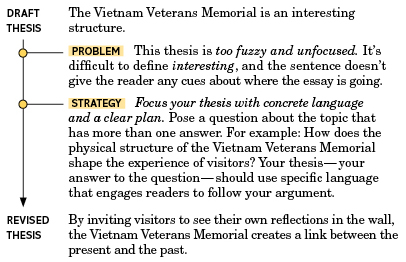Revising a vague thesis
The following thesis is too vague and unfocused. It is hard to say where this paper will go or what it will argue. Fuzzy, hard-to-define words such as interesting, good, or disgusting don’t carry the same meanings for every reader, so they often don’t lead to a clear point.
A strong thesis will establish a direction for the writer and reader. The revised thesis indicates to the reader that the writer will focus on one aspect of the memorial—the wall—and on what it means for the viewer.

Effective thesis statements
Exercise: Thesis statements 1
Exercise: Thesis statements 2
Related topics:
Revising a thesis that is too factual
Revising a thesis that is too broad
Drafting the body